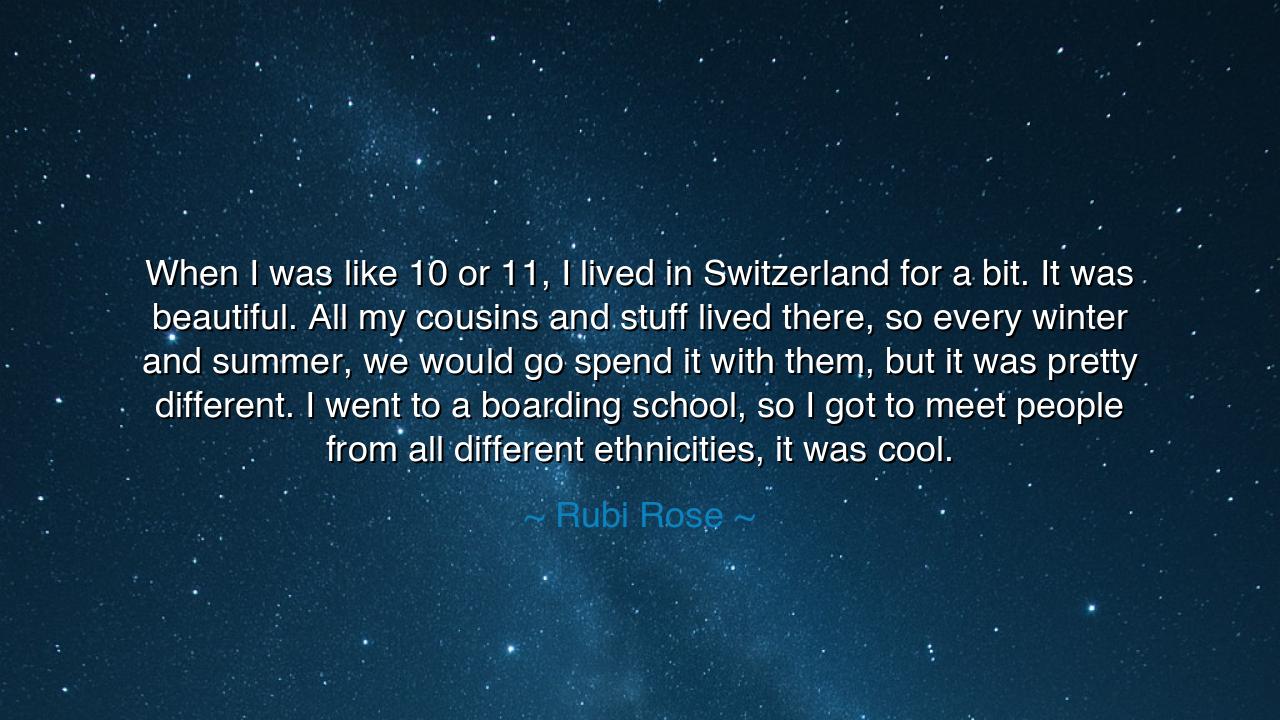
When I was like 10 or 11, I lived in Switzerland for a bit. It
When I was like 10 or 11, I lived in Switzerland for a bit. It was beautiful. All my cousins and stuff lived there, so every winter and summer, we would go spend it with them, but it was pretty different. I went to a boarding school, so I got to meet people from all different ethnicities, it was cool.






When Rubi Rose shared the story of her time in Switzerland, saying, “When I was like 10 or 11, I lived in Switzerland for a bit. It was beautiful. All my cousins and stuff lived there, so every winter and summer, we would go spend it with them, but it was pretty different. I went to a boarding school, so I got to meet people from all different ethnicities, it was cool,” she revealed more than just a memory of childhood; she spoke to the transformative power of exposure and diversity. At a young age, she was introduced to the world beyond her own immediate environment, and this exposure broadened her horizons in ways that would shape her future. It is in such experiences that the fabric of identity is woven—not just by where we come from, but by the experiences we have and the people we meet along the way.
The ancients knew well the transformative power of encountering new cultures. Alexander the Great, in his conquests, did not merely subdue lands; he sought to merge cultures, blending Greek customs with those of the territories he conquered. In doing so, he created an empire not defined by one ethnicity but by a shared experience of exchange. Just as Rubi Rose found herself in an environment rich with people from different backgrounds, Alexander’s empire was shaped by a convergence of ideas, traditions, and languages. This exposure to diversity allowed for greater innovation and cultural richness, and it was this blending that helped form one of the greatest empires in history.
Similarly, the Romans understood that exposure to a variety of cultures was essential for the growth of their society. Cicero, the Roman philosopher, spoke often about the value of understanding different people and their ways of life. To him, a true citizen of the world was one who could move freely between different cultures, adapting to new ideas while holding onto the core principles of Roman identity. The Romans were not isolated in their worldview but were enriched by the vast array of peoples and ideas they encountered throughout their empire. The value of broadening one’s perspective was embedded in the Roman way of life, and it helped forge an empire that was able to evolve and thrive.
In a more personal and modern context, the life of Mahatma Gandhi reflects this same idea of identity being shaped by diverse experiences. Gandhi’s time in South Africa, where he encountered discrimination and different cultural values, profoundly shaped his worldview. It was there that he began to formulate his ideas on nonviolent resistance and social justice, ideas that were influenced by his interactions with various communities. His ability to adapt and learn from these experiences showed the power of stepping outside one’s own familiar surroundings to truly understand the world. Just as Rubi Rose’s experience in Switzerland shaped her sense of self, Gandhi’s time abroad shaped his leadership and his ability to unite diverse people toward a common cause.
When Rubi Rose mentions meeting people from different ethnicities, she speaks to the core of what it means to be human in a globalized world. Identity is not a singular, fixed thing; it is built upon the experiences we have and the people we meet. By embracing these encounters, whether through travel, education, or community, we find parts of ourselves that were previously hidden. This experience, especially at a young age, has the power to shape one’s values, aspirations, and worldview. Rubi Rose’s openness to these experiences allowed her to grow into an artist who is able to connect with a wide range of audiences, transcending boundaries of culture, race, and geography.
The deeper lesson here is one of open-mindedness and embracing diversity. The world is vast, filled with a multitude of cultures, ideas, and ways of life. To limit ourselves to one perspective is to narrow our potential for growth. Just as Rubi Rose was enriched by the diversity she encountered in Switzerland, we too can seek out experiences that broaden our understanding and expand our sense of self. Whether through travel, meeting new people, or simply being open to new ideas, we should seek to engage with the world beyond our own familiar spaces.
In your own life, seek out opportunities to engage with the diverse world around you. Let your identity be shaped not just by your immediate environment but by the experiences that challenge you to think differently, to understand others, and to embrace change. By doing so, you will become not just a product of your past, but an evolving individual who is always learning and growing, shaped by the diverse experiences that make the world a richer place. Like Rubi Rose, who discovered the value of encountering people from different walks of life, you too can find greater wisdom and strength by embracing the many worlds that exist beyond your own.






AAdministratorAdministrator
Welcome, honored guests. Please leave a comment, we will respond soon